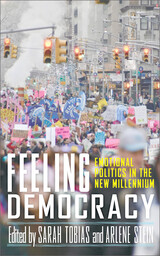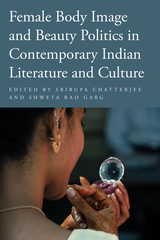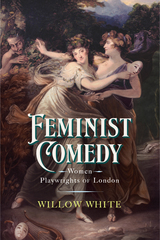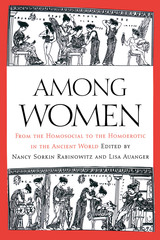
Women's and men's worlds were largely separate in ancient Mediterranean societies, and, in consequence, many women's deepest personal relationships were with other women. Yet relatively little scholarly or popular attention has focused on women's relationships in antiquity, in contrast to recent interest in the relationships between men in ancient Greece and Rome. The essays in this book seek to close this gap by exploring a wide variety of textual and archaeological evidence for women's homosocial and homoerotic relationships from prehistoric Greece to fifth-century CE Egypt.
Drawing on developments in feminist theory, gay and lesbian studies, and queer theory, as well as traditional textual and art historical methods, the contributors to this volume examine representations of women's lives with other women, their friendships, and sexual subjectivity. They present new interpretations of the evidence offered by the literary works of Sappho, Ovid, and Lucian; Bronze Age frescoes and Greek vase painting, funerary reliefs, and other artistic representations; and Egyptian legal documents.
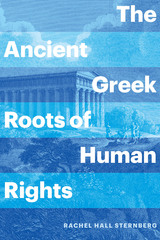
2022 PROSE Award Finalist in Classics
Although the era of the Enlightenment witnessed the rise of philosophical debates around benevolent social practice, the origins of European humane discourse date further back, to Classical Athens. The Ancient Greek Roots of Human Rights analyzes the parallel confluences of cultural factors facing ancient Greeks and eighteenth-century Europeans that facilitated the creation and transmission of humane values across history. Rachel Hall Sternberg argues that precursors to the concept of human rights exist in the ancient articulation of emotion, though the ancient Greeks, much like eighteenth-century European societies, often failed to live up to those values.
Merging the history of ideas with cultural history, Sternberg examines literary themes upholding empathy and human dignity from Thucydides’s and Xenophon’s histories to Voltaire’s Candide, and from Greek tragic drama to the eighteenth-century novel. She describes shared impacts of the trauma of war, the appeal to reason, and the public acceptance of emotion that encouraged the birth and rebirth of humane values.
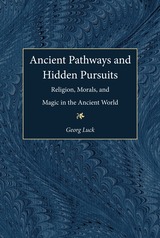
The present volume includes the author's thoughts on Greek and Roman religions, early Christianity, Greek and Roman psychology and morals, and magic and the occult. Luck's main findings explore generally neglected areas of ancient civilization, locating magic and philosophy with religion as vehicles for moral and psychological guidance. Throughout this study, one finds meaning in "superstitious" and conflicting patterns of behavior and learns much about the nature of the human soul. This collection will serve as a valuable reference for those interested in the driving motivations of ancient man.
"The topics of the individual articles in this volume are very central and of great humanistic appeal, and they indeed form a thematic unity concerning man and religion in Greek and Roman society." --Ludwig Koenen, Herbert C. Youtie Distinguished University Professor of Papyrology, University of Michigan
Georg Luck is Professor of Classics, emeritus, The Johns Hopkins University.
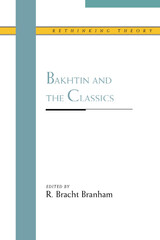
The authors, eminent classicists and distinguished critics of Bakhtin, put Bakhtin into dialogue with the classics--and classicists into dialogue with Bakhtin. Each essay offers a critical account of an important aspect of Bakhtin's thought and examines the value of his approach in the context of literary or cultural history. Beginning with an overview of Bakhtin's notion of carnival laughter, perhaps his central critical concept, the volume explores Bakhtin's thought and writing in relation to Homer's epic verse. Catullus's lyric poetry, ancient Roman novels, and Greek philosophy from Aristotle's theory of narrative to the work of Antiphon the Sophist. The results are of interest and importance to Bakhtinians, theorists, and classicists.
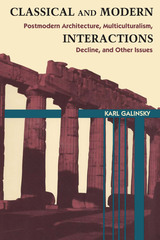
Postmodernism, multiculturalism, the alleged decline of the United States, deconstruction, leadership, and values—these topics have been at the forefront of contemporary intellectual and cultural debate and are likely to remain so for the near future. Participants in the debate can usefully enlarge the perspective to a comparison between the Greco-Roman world and contemporary society. In this thought-provoking work, a noted classics scholar tests the ancient-modern comparison, showing what it can add to the contemporary debates and what its limitations are.
Writing for intellectually adventurous readers, Galinsky explores Greece and Rome as multicultural societies, debates the merits of classicism in postmodern architecture, discusses the reign of Augustus in terms of modern leadership theories, and investigates the modern obsession with finding parallels between the supposed "decline and fall" of Rome and the "decay" of U.S. society.
Within these discussions, Galinsky shows the continuing vitality of the classical tradition in the contemporary world. The Greek and Roman civilizations have provided us not only with models for conscious adaptation but also points for radical departures. This ability to change and innovate from classical models is crucial, Galinsky maintains. It creates a reciprocal process whereby contemporary issues are projected into the past while aspects of the ancient world are redefined in terms of current approaches.
These essays result in a balanced assessment and stimulating restatement of some major issues in both contemporary U.S. society and the Greco-Roman world. The book, which speaks to a wide interdisciplinary audience, is based on a series of lectures that Galinsky gave as a national visiting scholar for Phi Beta Kappa. It concludes with a discussion of the role of classical studies in the United States today.
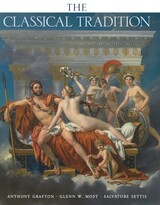
“A vast cabinet of curiosities.”—Stephen Greenblatt
“Eclectic rather than exhaustive, less an encyclopedia than a buffet.”—Frederic Raphael, Literary Review
How do we get from the polis to the police? Or from Odysseus’s sirens to an ambulance’s? The legacy of ancient Greece and Rome has been imitated, resisted, misunderstood, and reworked by every culture that followed. In this volume, some five hundred articles by a wide range of scholars investigate the afterlife of this rich heritage in the fields of literature, philosophy, art, architecture, history, politics, religion, and science.
Arranged alphabetically from Academy to Zoology, the essays—designed and written to serve scholars, students, and the general reader alike—show how the Classical tradition has shaped human endeavors from art to government, mathematics to medicine, drama to urban planning, legal theory to popular culture.
At once authoritative and accessible, learned and entertaining, comprehensive and surprising, and accompanied by an extensive selection of illustrations, this guide illuminates the vitality of the Classical tradition that still surrounds us today.
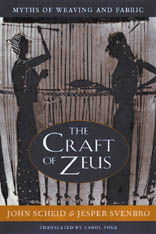


The papers in this volume are based on a 2006 Princeton University symposium in honor of Glen W. Bowersock on the occasion of his retirement from the faculty of the Institute for Advanced Study. Here a distinguished international group of ancient historians explores the classical antiquity that Bowersock has given us over a scholarly career of almost fifty years.
The topics offered in East and West range throughout the ancient world from the second century BCE to late antiquity, from Hellenistic Greece and Republican Rome to Egypt and Arabia, from the Second Sophistic to Roman imperial discourse, from Sulla’s self-presentation in his memoirs to charitable giving among the Manichaeans in Egypt.
This collection of essays represents the first attempt to take in Glen Bowersock’s well-developed scholarly interests as a whole. The contributors open up new avenues that often run well beyond the conventional geographical and temporal boundaries of the Greco-Roman Mediterranean, leading to a host of fresh insights into antique thought and life.
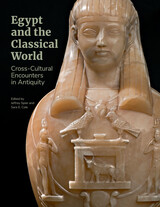
From Mycenaean weaponry found among the cargo of a Bronze Age shipwreck off the Turkish coast to the Egyptian-inspired domestic interiors of a luxury villa built in Greece during the Roman Empire, Egypt and the Classical World documents two millennia of cultural and artistic interconnectedness in the ancient Mediterranean. This volume gathers pioneering research from the Getty scholars' symposium that helped shape the major international loan exhibition Beyond the Nile: Egypt and the Classical World (J. Paul Getty Museum, 2018).
Generously illustrated essays consider a range of artistic and other material evidence, including archaeological finds, artworks, papyri, and inscriptions, to shed light on cultural interactions between Egypt, Greece, and Rome from the Bronze Age to the Late Period and Ptolemaic dynasty to the Roman Empire. The military's role as a conduit of knowledge and ideas in the Bronze Age Aegean, and an in-depth study of hieroglyphic Egyptian inscriptions found on Roman obelisks offer but two examples of scholarly lacunae addressed by this publication. Specialists across the fields of art history, archaeology, Classics, Egyptology, and philology will benefit from the volume's investigations into syncretic processes that enlivened and informed nearly twenty-five hundred years of dynamic cultural exchange.
The free online edition of this open-access publication is available at www.getty.edu/publications/egypt-classical-world/ and includes zoomable, high-resolution photography. Also available are free PDF, EPUB, and Kindle/MOBI downloads of the book.

From Abortion to Pederasty: Addressing Difficult Topics in the Classics Classroom, edited by Nancy Sorkin Rabinowitz and Fiona McHardy, is committed to the proposition that it is important to continue to teach texts that raise these issues, not to avoid them. In this volume, classicists and ancient historians from around the world address how to teach such topics as rape, pederasty, and slavery in the classics classroom. The contributors present the concrete ways in which they themselves have approached such issues in their course planning and in their responses to students’ needs.
A main objective of From Abortion to Pederasty is to combat arguments, from both the left and the right, that the classics are elitist and irrelevant. Indeed, they are so relevant, and so challenging, as to be painful at times. Another objective is to show how Greco-Roman culture and history can provide a way into a discussion that might have been difficult or even traumatic in other settings. Thus it will provide teaching tools for dealing with uncomfortable topics in the classroom, including homophobia and racism.
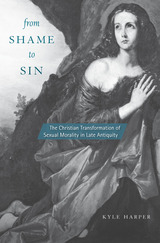
When Rome was at its height, an emperor’s male beloved, victim of an untimely death, would be worshipped around the empire as a god. In this same society, the routine sexual exploitation of poor and enslaved women was abetted by public institutions. Four centuries later, a Roman emperor commanded the mutilation of men caught in same-sex affairs, even as he affirmed the moral dignity of women without any civic claim to honor. The gradual transformation of the Roman world from polytheistic to Christian marks one of the most sweeping ideological changes of premodern history. At the center of it all was sex. Exploring sources in literature, philosophy, and art, Kyle Harper examines the rise of Christianity as a turning point in the history of sexuality and helps us see how the roots of modern sexuality are grounded in an ancient religious revolution.
While Roman sexual culture was frankly and freely erotic, it was not completely unmoored from constraint. Offending against sexual morality was cause for shame, experienced through social condemnation. The rise of Christianity fundamentally changed the ethics of sexual behavior. In matters of morality, divine judgment transcended that of mere mortals, and shame—a social concept—gave way to the theological notion of sin. This transformed understanding led to Christianity’s explicit prohibitions of homosexuality, extramarital love, and prostitution. Most profound, however, was the emergence of the idea of free will in Christian dogma, which made all human action, including sexual behavior, accountable to the spiritual, not the physical, world.
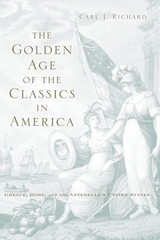
In a masterful study, Carl J. Richard explores how the Greek and Roman classics became enshrined in American antebellum culture. For the first time, knowledge of the classics extended beyond aristocratic males to the middle class, women, African Americans, and frontier settlers.
The classics shaped how Americans interpreted developments around them. The example of Athens allowed politicians of the democratic age to espouse classical knowledge without seeming elitist. The Industrial Revolution produced a backlash against utilitarianism that centered on the classics. Plato and other ancients had a profound influence on the American romantics who created the first national literature, and pious Christians in an age of religious fervor managed to reconcile their faith with the literature of a pagan culture. The classics supplied both sides of the slavery debate with their chief rhetorical tools: the Aristotelian defense of slavery to Southern slaveholders and the concept of natural law to the Northern abolitionists.
The Civil War led to a radical alteration of the educational system in a way that steadily eroded the preeminence of the classics. They would never regain the profound influence they held in the antebellum era.
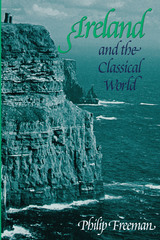
On the boundary of what the ancient Greeks and Romans considered the habitable world, Ireland was a land of myth and mystery in classical times. Classical authors frequently portrayed its people as savages—even as cannibals and devotees of incest—and evinced occasional uncertainty as to the island's shape, size, and actual location. Unlike neighboring Britain, Ireland never knew Roman occupation, yet literary and archaeological evidence prove that Iuverna was more than simply terra incognita in classical antiquity.
In this book, Philip Freeman explores the relations between ancient Ireland and the classical world through a comprehensive survey of all Greek and Latin literary sources that mention Ireland. He analyzes passages (given in both the original language and English) from over thirty authors, including Julius Caesar, Strabo, Tacitus, Ptolemy, and St. Jerome. To amplify the literary sources, he also briefly reviews the archaeological and linguistic evidence for contact between Ireland and the Mediterranean world.
Freeman's analysis of all these sources reveals that Ireland was known to the Greeks and Romans for hundreds of years and that Mediterranean goods and even travelers found their way to Ireland, while the Irish at least occasionally visited, traded, and raided in Roman lands. Everyone interested in ancient Irish history or Classics, whether scholar or enthusiast, will learn much from this pioneering book.

A paperback anthology of essential Greek and Latin texts with facing English translations.
“It is ideal reading for bar, bus, bed or beach. Everyone, teacher and taught alike, should have one. It is this year’s must-have present.”—The Journal of Classics Teaching
This selection of lapidary nuggets drawn from thirty-three of antiquity’s major authors includes poetry, dialogue, philosophical writing, history, descriptive reports, satire, and fiction—giving a glimpse at the wide range of arts and sciences, thought and styles, of Greco-Roman culture.
The selections span twelve centuries, from Homer to Saint Jerome. The texts and translations are reproduced as they appear in Loeb volumes.
The Loeb Classical Library is the only existing series that, through original text and English translation, gives access to all that is important in Greek and Latin literature. A Loeb Classical Library Reader offers a unique sampling of this treasure trove.
In these pages you will find, for example: Odysseus tricking the Cyclops in order to escape from the giant’s cave; Zeus creating the first woman, Pandora, cause of mortals’ hardships ever after; the Athenian general Nicias dissuading his countrymen from invading Sicily; Socrates, condemned to die, saying farewell; a description of Herod’s fortified palace at Masada; Cicero’s thoughts on what we owe our fellow men; Livy’s description of the rape of the Sabine women; Manilius on the signs of the zodiac; and Pliny’s observation of the eruption of Vesuvius in AD 79.
Here you can enjoy looking in on people, real and imaginary, who figure prominently in ancient history, and on notable events. Here, too, you can relish classical poetry and comedy, and get a taste of the ideas characteristic of the splendid culture to which we are heir.
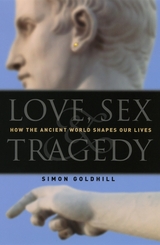
Marx, Clark Gable, George W. Bush, Oscar Wilde, and Freud—Goldhill's range here is enormous, and he takes great delight in tracing both follies and fundamental philosophical questions through the centuries and continents to the birthplace of Western civilization as we know it. Underlying his brisk and learned excursions through history and art is the foundational belief, following Cicero, that learning about the classics makes a critical difference to our self-understanding. Whether we are considering the role of religion in contemporary society, our expectations about the boundaries between public and private life, or even how we spend our free time, recognizing the role of the classics is integral to our comprehension of modern life and our place in it.
When Goldhill asks "Who do you think you are?" he presents us with the rarest of opportunities: the chance to let him lead us, firmly but with a wink, back two thousand years to where we are.
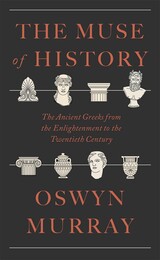
How the modern world understood the ancient Greeks and why they matter today.
The study of ancient Greece has been central to Western conceptions of history since the Renaissance. The Muse of History traces the shifting patterns of this preoccupation in the last three centuries, in which successive generations have reinterpreted the Greeks in the light of their contemporary worlds. Thus, in the eighteenth century, the conflict between Athens and Sparta became a touchstone in the development of republicanism, and in the nineteenth, Athens came to represent the democratic ideal. Amid the ideological conflicts of the twentieth century, the Greeks were imagined in an age of suffering, inspiring defenses against nationalism, Nazism, communism, and capitalism.
Oswyn Murray draws powerful conclusions from this historiography, using the ever-changing narrative of ancient Greece to illuminate grand theories of human society. Analyzing the influence of historians and philosophers including Hegel, Burckhardt, Nietzsche, and Braudel, Murray also considers how coming generations might perceive the Greeks. Along the way, The Muse of History offers rare behind-the-scenes glimpses of figures who shaped the study of ancient Greece, some devotedly cited to this day and others forgotten. We sit in on a class with Arnaldo Momigliano; meet Moses Finley after his arrival in England; eavesdrop on Paul Veyne, Jean-Pierre Vernant, and Pierre Vidal-Naquet; and rediscover Michel Foucault.
A thrilling work that rewrites established scholarly traditions and locates important ideas in unexpected places, The Muse of History reminds us that the meaning of the past is always made in and for the present.
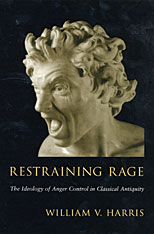
The angry emotions, and the problems they presented, were an ancient Greek preoccupation from Homer to late antiquity. From the first lines of the Iliad to the church fathers of the fourth century A.D., the control or elimination of rage was an obsessive concern. From the Greek world it passed to the Romans.
Drawing on a wide range of ancient texts, and on recent work in anthropology and psychology, Restraining Rage explains the rise and persistence of this concern. W. V. Harris shows that the discourse of anger-control was of crucial importance in several different spheres, in politics--both republican and monarchical--in the family, and in the slave economy. He suggests that it played a special role in maintaining male domination over women. He explores the working out of these themes in Attic tragedy, in the great Greek historians, in Aristotle and the Hellenistic philosophers, and in many other kinds of texts.
From the time of Plato onward, educated Greeks developed a strong conscious interest in their own psychic health. Emotional control was part of this. Harris offers a new theory to explain this interest, and a history of the anger-therapy that derived from it. He ends by suggesting some contemporary lessons that can be drawn from the Greek and Roman experience.
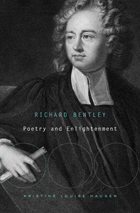
What made the classical scholar Richard Bentley deserve to be so viciously skewered by two of the literary giants of his day—Jonathan Swift in the Battle of the Books and Alexander Pope in the Dunciad? The answer: he had the temerity to bring classical study out of the scholar's closet and into the drawing rooms of polite society. Kristine Haugen’s highly engaging biography of a man whom Rhodri Lewis characterized as “perhaps the most notable—and notorious—scholar ever to have English as a mother tongue” affords a fascinating portrait of Bentley and the intellectual turmoil he set in motion.
Aiming at a convergence between scholarship and literary culture, the brilliant, caustic, and imperious Bentley revealed to polite readers the doings of professional scholars and induced them to pay attention to classical study. At the same time, Europe's most famous classical scholar adapted his own publications to the deficiencies of non-expert readers. Abandoning the church-oriented historical study of his peers, he worked on texts that interested a wider public, with spectacular and—in the case of his interventionist edition of Paradise Lost—sometimes lamentable results.
If the union of worlds Bentley craved was not to be achieved in his lifetime, his provocations show that professional humanism left a deep imprint on the literary world of England's Enlightenment.
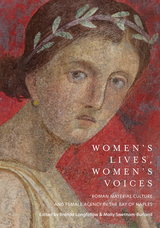
Literary evidence is often silent about the lives of women in antiquity, particularly those from the buried cities of Pompeii and Herculaneum. Even when women are considered, they are often seen through the lens of their male counterparts. In this collection, Brenda Longfellow and Molly Swetnam-Burland have gathered an outstanding group of scholars to give voice to both the elite and ordinary women living on the Bay of Naples before the eruption of Vesuvius.
Using visual, architectural, archaeological, and epigraphic evidence, the authors consider how women in the region interacted with their communities through family relationships, businesses, and religious practices, in ways that could complement or complicate their primary social roles as mothers, daughters, and wives. They explore women-run businesses from weaving and innkeeping to prostitution, consider representations of women in portraits and graffiti, and examine how women expressed their identities in the funerary realm. Providing a new model for studying women in the ancient world, Women’s Lives, Women’s Voices brings to light the day-to-day activities of women of all classes in Pompeii and Herculaneum.
READERS
Browse our collection.
PUBLISHERS
See BiblioVault's publisher services.
STUDENT SERVICES
Files for college accessibility offices.
UChicago Accessibility Resources
home | accessibility | search | about | contact us
BiblioVault ® 2001 - 2024
The University of Chicago Press


